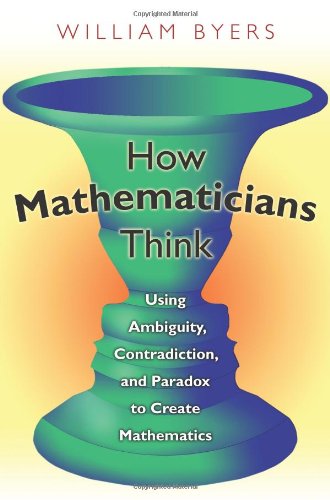How Mathematicians Think : Using Ambiguity, Contradiction, and Paradox to Create Mathematics
Byers, William
Verkäufer
Better World Books, Mishawaka, IN, USA
Verkäuferbewertung 5 von 5 Sternen
![]()
AbeBooks-Verkäufer seit 3. August 2006
Beschreibung
Beschreibung:
Former library book; may include library markings. Used book that is in excellent condition. May show signs of wear or have minor defects. Bestandsnummer des Verkäufers 9849640-6
Inhaltsangabe:
To many outsiders, mathematicians appear to think like computers, grimly grinding away with a strict formal logic and moving methodically - even algorithmically - from one black-and-white deduction to another. Yet, mathematicians often describe their most important breakthroughs as creative, intuitive responses to ambiguity, contradiction, and paradox. A unique examination of this less-familiar aspect of mathematics, "How Mathematicians Think" reveals that mathematics is a profoundly creative activity and not just a body of formalized rules and results.Nonlogical qualities, William Byers shows, play an essential role in mathematics. Ambiguities, contradictions, and paradoxes can arise when ideas developed in different contexts come into contact. Uncertainties and conflicts do not impede but rather spur the development of mathematics. Creativity often means bringing apparently incompatible perspectives together as complementary aspects of a new, more subtle theory. The secret of mathematics is not to be found only in its logical structure. The creative dimensions of mathematical work have great implications for our notions of mathematical and scientific truth, and "How Mathematicians Think" provides a novel approach to many fundamental questions. Is mathematics objectively true? Is it discovered or invented? And is there such a thing as a "final" scientific theory? Ultimately, "How Mathematicians Think" shows that the nature of mathematical thinking can teach us a great deal about the human condition itself
Über die Autorin bzw. den Autor: William Byers is professor of mathematics at Concordia University in Montreal. He has published widely in mathematics journals.
Bibliografische Details
Titel: How Mathematicians Think : Using Ambiguity, ...
Verlag: Princeton University Press
Erscheinungsdatum: 2007
Einband: Hardcover
Zustand: Very Good
Auflage: 1st Edition.
Beste Suchergebnisse beim ZVAB
How Mathematicians Think : Using Ambiguity, Contradiction, and Paradox to Create Mathematics
Anbieter: Better World Books, Mishawaka, IN, USA
Zustand: Good. 1st Edition. Former library book; may include library markings. Used book that is in clean, average condition without any missing pages. Artikel-Nr. 5780777-6
Anzahl: 2 verfügbar
How Mathematicians Think : Using Ambiguity, Contradiction, and Paradox to Create Mathematics
Anbieter: Better World Books: West, Reno, NV, USA
Zustand: Good. 1st Edition. Former library book; may include library markings. Used book that is in clean, average condition without any missing pages. Artikel-Nr. 5780777-6
Anzahl: 1 verfügbar

